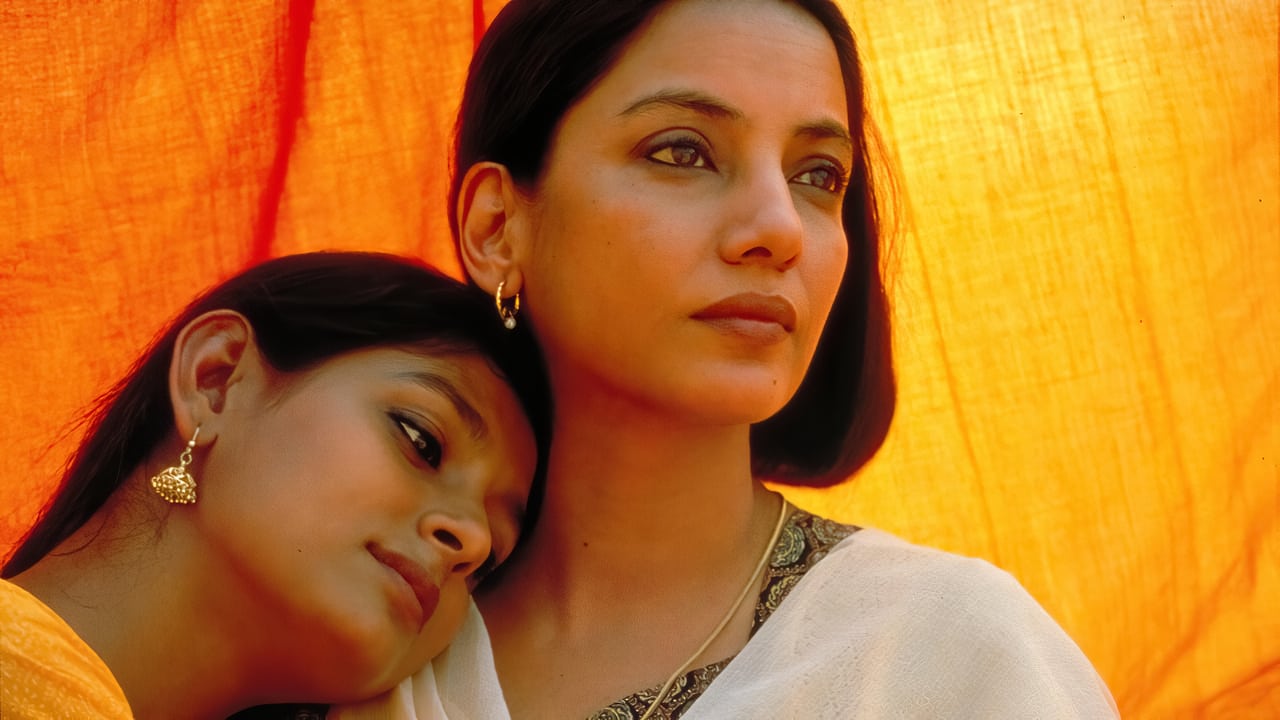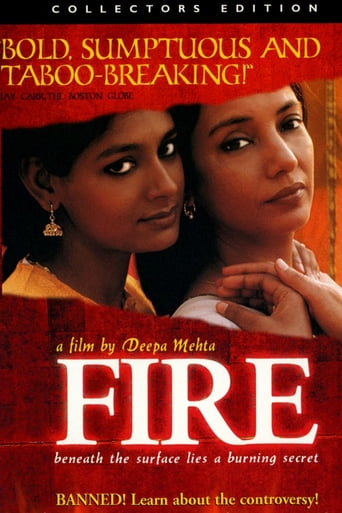



SERIOUSLY. This is what the crap Hollywood still puts out?
View MoreThe performances transcend the film's tropes, grounding it in characters that feel more complete than this subgenre often produces.
View MoreIt really made me laugh, but for some moments I was tearing up because I could relate so much.
View MoreIt's simply great fun, a winsome film and an occasionally over-the-top luxury fantasy that never flags.
View MoreA melodramatic tale about the journey of two women towards Self-actualisation. This movie from the award-winning filmmaker Deepa Mehta perfectly depicts the illiberal ideas entrenched in our bigoted society. Mehta's Elements trilogy, Fire, Earth, and Water distinctly personify her visions and her elegance in filmmaking.Sita(Nandita Das) is entering a new family after her wedding. The family consists of her spouse Jatin(Javed Jaffrey), her brother in law Ashok and his wife Radha(Shabana Azmi) and the matriarch of the family is Biji. Biji is taken cared by the servant Mundu but often infuriates the old lady.Sita is a soul which dares to dream. She is bound by no shackles. But the married life has been quite tough on her after she found her husband to be cheating on her. During a conversation Radha tells Sita that she is infertile,"No eggs in ovaries " were the exact words to be precise and for that reason, her husband has vowed to celibacy under the influence of a Swamiji who has preached him that desire was the root of all evil. These two women gradually embrace each other and rediscover their sexuality and in the process rediscover their will to live a life that they wished to live in a cloudland.Mehta's effort to intricately design the characters has a positive impact on screen as it wasn't judgemental rather each character's reflections of their opinions.Azhagi fame Nandita Das has flabbergasted us with her role. Takeshi's Castle fame Javed Jaffrey has made his role look so easy. The entire team has done just to their roles, making this a movie that every movie maniac will savour.In 1998 Fire was screened in India.For its content of displaying Homosexuality as a non-evil custom, the movie garnered immense controversy. There were riots in various parts the country. Shiv sanaiks and Bajrang Dal members invaded and vandalized the theatres. Even now, After two decades from this film's release, the Section 377 is still a matter of debate. With many countries legalizing homosexuality, India has failed miserably and it nowhere near to making the right verdict. Releasing a movie that is against the prejudices in the 90's was gutsy and they deserve to be applauded but all they received was criticism.A movie that everyone should watch and a movie that everyone can relate to. Fire beautifully portrays so many human qualities like self-acceptance, self-actualization, Love, Passion, Sexuality. The movie deserves to be celebrated.
View MoreFire (1996) is an Indian film written and directed by Deepa Mehta. The movie stars Nandita Das as Sita, a young wife who quickly learns that her husband neither loves nor desires her. She lives in the same household as her older brother-in-law and his wife (played by the Indian star Shabana Azmi). Although both members of this couple care for each other, the husband's guru has taught him that he must conquer desire. So, he and his wife are celibate.Almost by default, the two women are drawn to each other. First this attraction is more for solace and companionship. Then it develops into a sexual relationship. As expected, there are serious and far-reaching consequences to their decision.Apparently this movie was considered scandalous when it was released. In the West, this theme would be unlikely to shock anyone. (The film would probably be rated PG-13.) It's not a movie to be seen for its shock value. I highly recommend it because of the sensitive treatment of the relationship between two people who desperately need love and find it with each other.We saw the movie on DVD, where it worked well. (Because most of the central scenes of the film take place within the home, a large screen wouldn't add much.) It's an excellent movie. I suggest you seek it out and view it.
View MoreBold, controversial and taboo-breaking are among the many attention-grabbing words that have been used to describe 'Fire' and this has no doubt helped the film gain recognition. However, I feel that such adjectives undermine the true beauty of that is depicted in this picture. It deals with many themes such as feminism, affection, love and freedom and at the heart of the film lies the relationship between Seeta and Radha. The bond between them is portrayed with such innocence, tenderness, affection and sensibility that its beauty stands out. The growth in the two characters and the development of their relationship is splendid to watch. While the relationship is portrayed with sensuality, there is no titillation or overt skin exposure.Due to the theme of homosexuality and the questioning of religion, 'Fire' was ridiculously banned in several countries. It is never specified whether Seeta or Radha were exclusively homosexual. They're never shown to not enjoy a sexual relationship with their respective male partners. Radha has made numerous attempts over the years to have that kind of intimacy with her celibate husband but he's the one who refuses while in Seeta's case, sex is a mechanical thing for her husband. What they Seeta and Radha find in each other is affection, love, desire and tenderness, something they yearned for but never had with their husbands.Many have argued that Deepa Mehta deliberately uses shock value and portrays India as repressed in order to make her film appeal to the Western audience. I don't know whether that was her intention with 'Fire' but to me it felt like an honest movie and the problems portrayed in this film are still very much a reality in India. I would even go as far to say that this is among Mehta's best works. Her use of metaphors is brave and gives the film a poetic feel.Mehta's films have often scored high in the technical department and 'Fire' is no different. Here the cinematography and A.R. Rahman's score particularly stand out. The music is mesmerizing. The art direction too is brilliant.Luminous Nandita Das is terrific as the young, vivacious and energetic Seeta. Shabana Azmi is once again transcendent. Her nuanced, quiet and restrained performance easily touch on the heartstrings. Kulbhushan Kharbanda and Javed Jaffrey provide good support.Forget all the labelling, controversial or not 'Fire' is worth seeing for the beauty it portrays when two people find love and freedom in each other.
View MoreThere are many plot points which were easy to see coming, which is the fault of the screenplay by Mehta. But the film is far too suffused with politics to approach greatness, even were it better written. It is not as overtly preachy and hammy as Brokeback Mountain, but it does make excuses for its adulterous lesbians, just as the Hollywood film basically makes heroes out of lying lowlife bastards. As example, while Jatin is certainly a fool and cheater, and Sita owes him no allegiance, the same cannot be said of Radha, for Ashok is certainly a devoted and loving husband. If she was not getting what she wanted, it was her right and duty to speak up and demand change, or leave with honor. His response to her barrenness may have been silly and wrong, but it was not accomplished without her complicity. Radha, in this sense, is the villain of the film, for while Jatin is a letch, he is shown as utterly void of depth. Mundu is a slimebag, but an insignificant little bug. But Radha has the ability to think and choose. She does not merely fall into her relationship with Sita, she chooses its deceptions over her first allegiance to her husband. If she wanted out or change, she should have spoken up, for the energy and will she displays in leaving him could have earlier been displayed within her marriage. Thus, she is an agent of the ill that befalls the family, not a victim, the way the naïve and forcefully betrothed Sita is.The other aspects of the film are well done, such as the musical soundtrack by A.R. Rahman, and the cinematography by Giles Nuttgens, but nothing that approaches greatness. The DVD, put out by New Yorker Video, has the 108 minute version of the film, and is shown in a 1.85:1 aspect ratio. There is no audio film commentary, but there is a theatrical trailer, cast profiles and production notes, and a documentary on the controversy the film caused in India, which led to its banning. All in all, it shows Indian culture in a very silly and puerile light.That said, the film, aside from its objective artistic flaws, also suffers from an insular take on its culture. To the non-Indian, as example, there are many political points meant for Indian society, alone, that are lost outside that milieu, and without these touchstone hot buttons as references, the film's political relevance fizzles- the best example being Sita's and Radha's names being based upon Hindu goddesses, and Sita being purged by fire- although in the film it is Radha who is purged by fire; a point Indian film critics lash out at, but which seem silly criticisms to foreign ears. Yet, ultimately, what causes Fire to only reach passable mediocrity as a film is the more immanent artistic flaws of screenplay, characterization, and political imposition. It is a film that is solid, but nothing worth viewing a second time, save for glimpsing the two gorgeous lipstick lesbians. Not that that is a bad thing, of course, but why not try Penthouse, instead? At least there you won't be subjected to puerile political statements.The film is the first of a trilogy of films, and was followed by Earth and Water, which seem to be less 'controversial,' as well as less pointedly provocative. Whether or not this equates with a genuine upgrade of the art is something to be seen, but there is potential here. It's just that Mehta's desire to make a cogent statement so overwhelms her desire to make it endure to future generations, and outside its natal setting, that this film fails. Rein that in, and she has the makings of an artist of consequence. I'll be watching.
View More